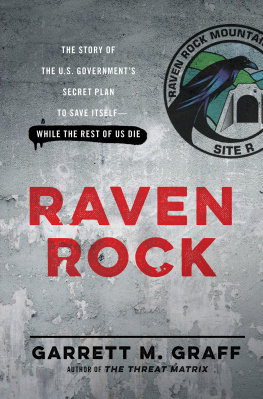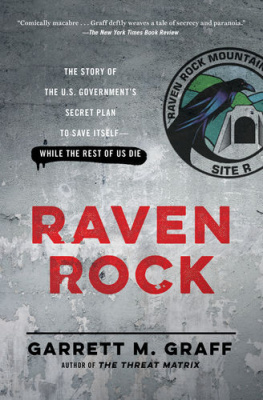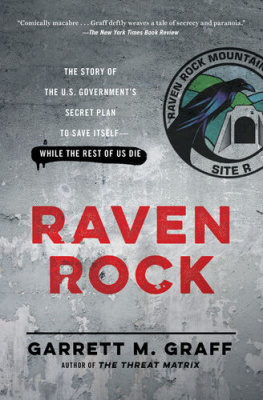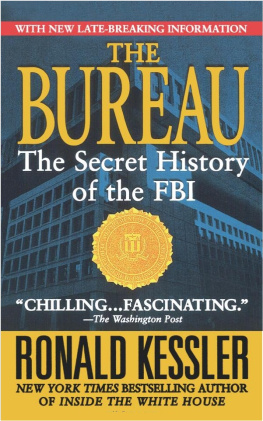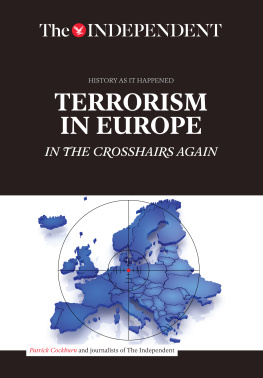For my grandfathers: Bert McCord, who started my family in journalism and whose name Im proud to carry forward, and John Price, who got my family interested in technology and died just hours before this book was completed
Public Enemy #1
I shall wage vigorous warfare against the enemies of my country, of its laws, and of its principles. I shall always be loyal to my duty, my organization, and my country.
From J. Edgar Hoovers FBI Pledge for Law Enforcement Officers
T he final minutes of George W. Bushs eight years as president ticked away as Bob Mueller stepped down onto the inaugural platform. Despite weeks of wall-to-wall news coverage warning of overcrowding for the inaugurationmillions of people who might clog the Washington Beltway and the Metro system for hoursthe chilly January day had deterred few inaugural-goers. More than perhaps anyone else on the inaugural platform, Mueller, the director of the FBI, was responsible for keeping everyone safe for the day.
The previous twenty-four hours had been nerve-racking, like so many of the days and nights of the past seven years. A threat out of the Middle East, sketchy at best. Reports of a man barreling down the Jersey Turnpike with a bomb. Agents from the FBI, the CIA, and a dozen other agencies fanned across country and several continents, hoping to run down the information before noon Tuesday, H-Hour for the handover of government, democracys greatest ritethe peaceful and amicable transfer of power from one party to another with nearly diametrically opposed views.
The last time the nation had gathered to do this, in January 2001, the world had been a different place. That was, as everyone now said, before. This was the first transfer of power after. Before, the Clinton administration had balked at targeting a shadowy terrorist named Osama bin Laden in a faraway place called Afghanistan. Before, the argument had been, What had bin Laden ever done to deserve assassination? The United States didnt do that type of thing. Now, after, everything was different.
Just days prior to the inauguration of Barack Obama, Hellfire missiles launched from a Predator drone half a world away from Washington had killed two Kenyans suspected in the 1998 attacks on the U.S. embassies in Tanzania and Kenya. Usama al-Kini, also known as Fahid Mohammed Ally Msalam, and Sheikh Ahmed Salim Swedan likely never saw the missiles closing on them at speeds topping Mach 1.3 and likely never felt the twenty-pound warheads explode. Although the FBIs global footprint had expanded considerably, the United States had no other practical means to eliminate this pair of terrorists. The two men, living in South Waziristana remote tribal part of Pakistan most Americans would be hard-pressed to locate on a mapwere unreachable. The CIA drones and their Hellfire missiles were a different type of justice, an outside-the-courtroom, permanent justiceone that, after, the U.S. government had decided was more than appropriate to mete out but had been off the table before. (The precise term for such measuresextralegalhad become all too familiar to the American people after.)
Al-Kini and Swedan were both on the Bureaus Most Wanted Terrorist list, making the attacks a big victory for the United States, yet, since the United States didnt acknowledge these covert missile strikes, it didnt officially consider them dead. Months later, both mens names would still be on the FBIs public list; inside the government, though, no one was looking too hard for them.
The minutes ticked away on inaugural day. Of the government men onstage, only a few had been in the fateful national security meeting the morning of September 12, 2001, the day after everything had changed. Now, in just two hours, most of them would depart government. A green-and-white Marine helicopter from HMX-1, the presidential helicopter squadron, sat on the East Front Plaza of the Capitol, waiting to ferry George W. Bush back to private life. Vice President Dick Cheney, confined to a wheelchair after straining his back moving boxes the weekend before, would also departonly to appear in the coming months as a vocal opponent of the new administrations approach to terrorism. Of the entire national security team, those departures would leave only Mueller still in the position he had held on September 11, 2001, that brilliant and crisp fall day when the planes had come.
Only one other member of the national security team would be carrying over from Bush to Obamaand his absence today was intentional. Hidden in a secure location outside Washington, Robert Gatesthe wizened secretary of defense who on 9/11 had been a dean at Texas A&Mwas, in the bland parlance of bureaucracy, the designated successor, part of the elaborate continuity-of-government plans created during the Cold War to ensure the United States would survive even the most catastrophic assault. Originally designed to protect against surprise Soviet intercontinental ballistic missiles coming in over the North Pole, the continuity-of-government operation now mostly guarded against terrorists with a smuggled nuclear weapon stuffed in a suitcase. In the coming hours, a new national security team would begin to flow into the federal apparatus across the city and move into the White House, where air pressure is always kept elevated to ensure biological or chemical agents cant penetrate inside. Only Mueller would be left among the security team to recall the fear, tension, and shock of September 12, 2001, the uncertainty of the day after. The soldiers in the streets; the smoke, visible from his office, rising from the Pentagon across the Potomac River; the concrete barriers that sprang up everywhere overnight like some sort of ugly, aggressive species of weed; that smellpart burning jet fuel, part burning paper, part burning flesh.
Mueller, wrapped in long overcoat and scarf, his gloved hands protected from the cold, walked to the front of the stage, his longtime wife and companion, Ann, by his side. On 9/11, just days after moving to Washington, she had sat through that historic day alone, watching the television in their temporary apartment six blocks from where they now stood. Her husband hadnt returned until long after shed gone to sleep.
From the banister, they could survey the largest crowd ever assembled for a presidential inauguration. It spread out for over a mile, the length of the National Mall, the nations so-called backyard. Somewhere out in the crowd were 155 teams of Muellers agents in plainclothes, watching for anything unusual. A few blocks away, the FBI Hostage Rescue Team, created thirty years earlier as the nations elite antiterror strike force, sat poised to react. To back them up, SWAT teams, hazardous-material units, bomb squads, and even weapons of mass destruction response teams were located at strategic points around the crowded city. Armored military-like vehicles topped with flashing lights were hidden just out of sight, ready for action. Police helicopters circled the city, their expensive sensors and surveillance gear hard at work. Gas masks hung from the waists of thousands of law enforcement personnel, as well as the National Guard troops who stood on every street corner for miles. Fighter jets bristling with missiles slung under their wings waited to respond to trouble from above, while deep beneath the city Secret Service agents searched tunnels and sewers for trouble below. Most military coups in the world were carried out with less firepower, materiel, and personnel than were deployed to the streets of Washington for what everyone hoped would be a peaceful and uneventful transition of power.


